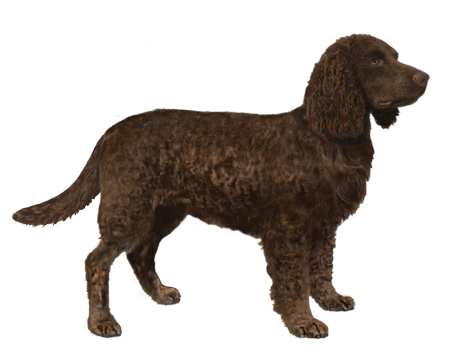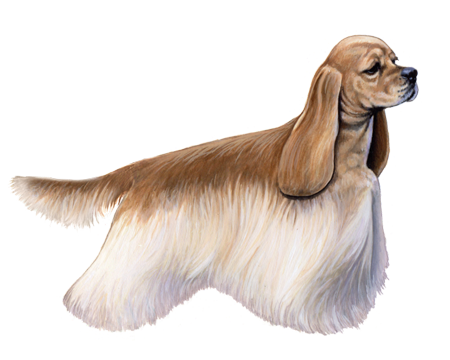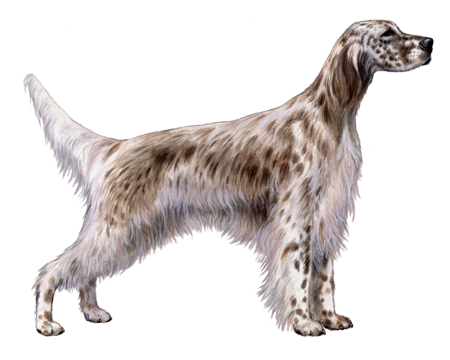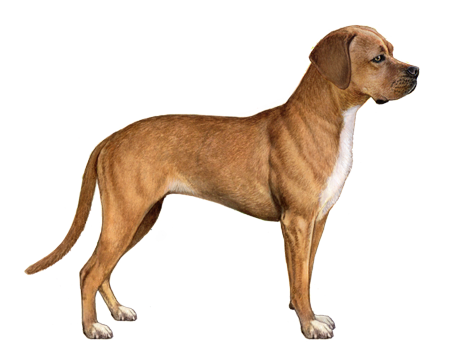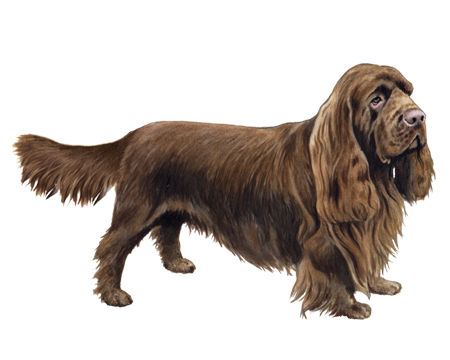
Deutscher Wachtelhund
The Deutscher Wachtelhund is a determined, courageous hunting breed. These pups have a strong willingness to work and a love of scent tracking that borders on obsessive. When not hunting alongside their humans, they make devoted family pets.
Interested in discovering if your dog is a Deutscher Wachtelhund?
Check out Wisdom Panel's DNA tests.

Deutscher Wachtelhund Traits
General Appearance
Deutscher Wachtelhunds are medium-sized, muscular dogs with noble heads and strong bones. They have graceful necks, compact bodies, and heavily feathered tails.
Coat and Coloring
This breed's hair is short and fine on the head and longer on the body. Deutscher Wachtelhunds' undercoats and thick wavy or curly hair protect them while hunting.
These dogs have a frill on the neck and feathering on the tail and back of the legs. And they come in two colors: solid brown (occasionally reddish)—often with white or ticked markings—or brown roan.
Distinctive Physical Traits
Deutscher Wachtelhunds have softly contoured heads with no sharp angles and slightly oval-shaped brown or hazel eyes set wide apart. Their ears lie flat and close to the head and are covered in long, silky hair that makes them appear longer than they are.
Deutscher Wachtelhund Temperament
Adaptable, friendly, affectionate dogs, Deutscher Wachtelhunds are quick to learn new things, love the water, and get along well with other pups. Though hunting is their true passion, they make loyal family dogs and enjoy spending time at home with their humans.
Because they love to follow a scent, Deutscher Wachtelhunds should be kept on a leash or in a fully fenced yard to keep them from wandering off when outside.


Deutscher Wachtelhund History
Deutscher Wachtelhunds descend from the Stober—an old German hunting breed with scent tracking skills that rival the Bloodhound. Stobers first appeared in historical records in 1719. But by the 1880s, the original line was in short supply.
Hoping to replicate the breed, German hunters located a few dogs in Bavaria and bred them with spaniels known for their strong hunting skills. The result was the Deutscher Wachtelhund (also known as the German Spaniel and German quail dog). Nowadays, primarily German hunters and gamekeepers keep these pups as hunting partners.
The breed arrived in the United States in the 1950s and later in Canada. But there are only about 150 dogs in North America now. The United Kennel Club recognized the Deutscher Wachtelhund in 1996, and the American Kennel Club has recorded the breed in their Foundation Stock Service since 2011.
Deutscher Wachtelhund Care
Nutrition
Deutscher Wachtelhunds thrive on a high-quality diet formulated for their life stage (e.g., puppy, adult, senior). To help your dog maintain a healthy weight, measure their meals to avoid overfeeding and keep an eye on how many treats you give them. As a guideline, treats should make up no more than 10% of a dog's daily calories.
Grooming
You should brush your Deutscher Wachtelhund weekly to remove loose fur and prevent tangles in their feathering. To reduce the risk of ear infections, check their ears regularly and remove any wax build-up or debris.
Nail trims should also be part of every dog's grooming routine. If your pup's nails grow too long, they can cause pain and potentially lead to problems running or walking.
Lastly, good dental hygiene will support your dog's overall health. Dental disease is one of the most common health conditions in adult dogs. Left untreated, it can contribute to other serious issues. In addition to professional cleanings, establish an at-home dental care program that includes regular teeth brushing and veterinarian-recommended dental chews.
Exercise
Deutscher Wachtelhunds need a moderate amount of daily exercise to be happy and healthy. Favorite activities include long walks on a leash, hikes, swimming, ball chasing, and hide-and-seek games. They're also well-suited for agility, rally, flyball, scent tracking, and other dog sports.
Training
Intelligent pups, Deutscher Wachtelhunds can easily learn commands and how to hunt various types of game. Positive reinforcement techniques work best when training this breed.
In addition to basic training, socializing your pup when they're young will help them develop into a well-mannered adult dog.
Breed Group
Sporting
The sporting group breeds are incredibly diverse in personality and appearance, but can be characterized as very sturdy. They were developed to work closely with people and in general have a very responsive nature and high intelligence.
Resources
http://www.fci.be/Nomenclature/Standards/104g08-en.pdf
https://www.akc.org/dog-breeds/deutscher-wachtelhund/
Reviewed June 16, 2021 by Laura Inman, DVM




